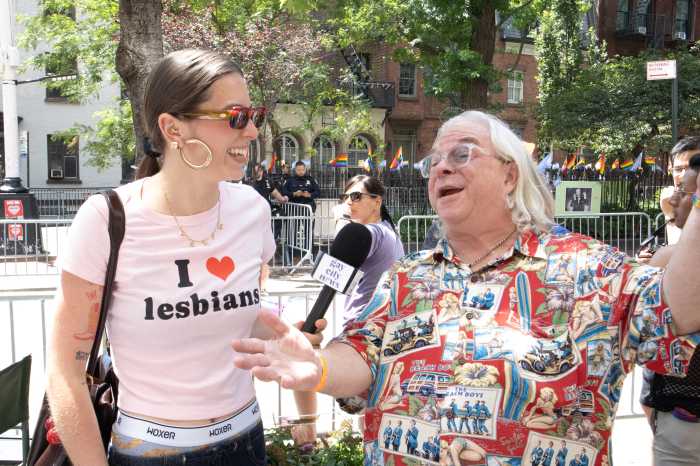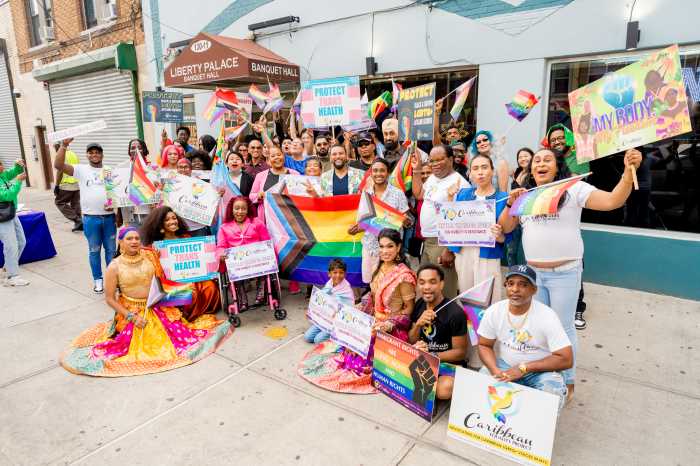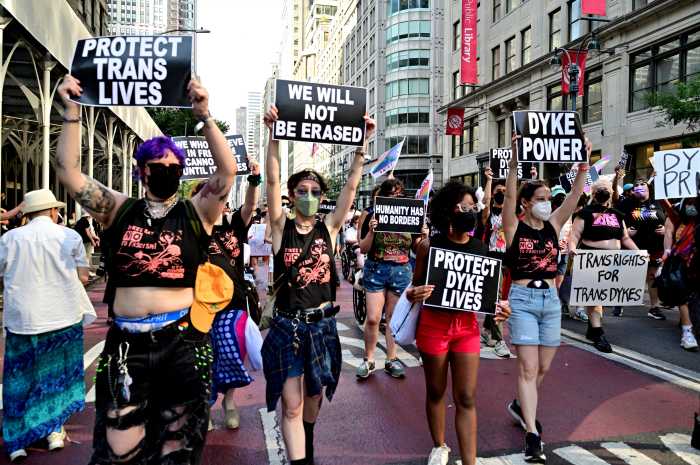Eleven arrested in sit-in as activists press on domestic, global fronts
With a crowd of several hundred nearby chanting, “End AIDS with a Wall Street tax, no more budget cuts on our backs,” 11 protesters blocked traffic on Lower Broadway in Manhattan for roughly 25 minutes just before noon on December 1.
The World AIDS Day demonstration, which began at Zuccotti Park on Liberty Street, site of the nearly two-month Occupy Wall Street (OWS) encampment, borrowed tactics and rhetoric from that outpouring of activism to make the point that the tax code impedes efforts to find sufficient dollars for both the domestic and global war on AIDS.
Before the demonstrators marched north up Broadway to City Hall, speakers at Zuccotti Park called for a “millionaire’s tax” in New York State that would shift a greater part of the burden onto the wealthiest and a financial transaction or “Robin Hood” tax to generate more money at the federal level to increase the US contribution to the Global Fund to Fight AIDS, TB and Malaria.
The demonstration employed the “human mic” made famous in the OWS general assembly meetings, in which the crowd repeated the words of each speaker to amplify their message.
And, the 11 protesters who blocked Broadway at Park Place just west of City Hall Park wore green Robin Hood outfits, with their shirts reading, “Bank $, Take It Back.”
That group, which included Charles King, the president of Housing Works, an AIDS services group, fanned out across Broadway at roughly 11:40 a.m., blocking southbound traffic. Police allowed them to stand there for about five minutes, and then began arresting them.
King and four others, however, were chained together and the NYPD apparently lacked a chain cutter to separate them. The five laid down on the street as the police scrambled to open several lanes of Broadway traffic. Police also attempted to drag the five protesters to the sidewalk, but soon gave up that effort.
After another ten minutes passed, police wielded two sets of cutters, separated the five, and arrested them.
Other groups participating in the protest included VOCAL-NY, which does political organizing among HIV-positive people, drugs users, and those formerly incarcerated; Health GAP, which advocates for an end to treatment barriers worldwide; and Bailey House, the city’s oldest AIDS housing organization.
The protest focused particular attention on the housing needs of people living with AIDS, criticizing Bloomberg administration cuts in city services for such housing of $10 million over the past year as well as the mayor’s opposition to capping the rents for PWAs living in privately-owned housing for which they receive government assistance at 30 percent of their income.
Gina Quattrochi, who heads Bailey House, said she boycotted Bloomberg’s annual AIDS breakfast at Gracie Mansion to protest the administration’s “draconian cuts to AIDS housing.”
Charlene Cooper, who told the crowd she’s been an AIDS activist for more than a decade, said she did attend the Gracie Mansion event.
“The mayor, as usual, lied to people with AIDS,” Cooper said. “He stated that the New York City HIV and AIDS Services Administration has improved, and we know better.”
Samantha Levine, a spokesman for Bloomberg, responded that city funding for HASA increased roughly $100 million during his ten years in office, from $149.1 million to $248 million, representing a 40 percent increase in spending per client during that period.
“HASA provides greater care and support for people with HIV or AIDS than anywhere in the country,” she said in an email message. “Thankfully, people diagnosed today with clinical symptomatic HIV illness or with AIDS in NYC are living longer, and HASA remains the most comprehensive program of its kind.”
Michael Tikili, a 25-year-old HIV-positive Health GAP staff member who noted he’s “never known a world without AIDS,” said he had “a message for Bloomberg and Obama: Tax Wall Street for the good of the people.”
Speakers and marchers alike demanded that the state tax rate on millionaires be raised while noting that the mayor is a billionaire. Though Bloomberg has consistently argued that higher taxes on the wealthiest New Yorkers would drive them to change their legal residence, the crowd was silent about the most important player in the Albany debate over taxes –– Democratic Governor Andrew Cuomo.
In his first year in office, the governor has echoed the mayor’s thoughts on a millionaire’s tax, saying the current recession is not a time for increasing anyone’s burden. This week, however, the Wall Street Journal reported that Cuomo is rethinking that position, though a spokesman for the governor told that newspaper no change is currently under consideration.
Health GAP’s Tikili was as outspoken about the Obama administration as he was about the mayor. Noting that Secretary of State Hillary Clinton recently pledged, in his words, “to create a generation without AIDS,” he added, “Talk is cheap.” He asked how the administration was “fostering a generation free of HIV/ AIDS” when it was offering no increase in funding for the Global Fund and negotiating trade agreements that strengthen the intellectual property rights of pharmaceutical companies at the expense of programs to distribute generic drugs to millions of HIV-infected people in the developing world.
A press release from the protest’s organizers stated that the Global Fund has said it cannot make new grants over the next two years because of broken pledges from donor nations.
As the demonstration was winding up, however, Health GAP issued a press release applauding Obama for committing in his World AIDS Day address, delivered moments before, to increase the number of people with access to antiretroviral (ARV) treatments by six million through the President’s Emergency Plan for AIDS Relief (PEPFAR).
“The president just put a powerful down payment toward the end of the AIDS crisis,” Matthew Kavanagh, Health GAP’s director of US advocacy, said in that release.
According to Health GAP, about 6.6 million people in “low and middle income countries” currently receive ARVs –– 3.2 million through PEPFAR, a US effort separate from the Global Fund.
Other advocacy groups, such as the AIDS Institute in Washington, also praised Obama’s statement.
Sean Barry, one of the directors of VOCAL-NY, termed the president’s announcement “genuinely good news,” but noted that no additional funding had specifically been pledged.
Barry also addressed treatment guidelines announced December 1 by the Bloomberg administration recommending that ARVs be offered to people as soon as they are diagnosed with the virus.
The Associated Press reported that City Health Commissioner Thomas Farley said that about 66,000 of the more than 110,000 New Yorkers living with HIV currently receive treatment and that his new recommendation would initially make ARVs available to another 3,000. The state’s AIDS Drug Assistance Program (ADAP), funded in part by federal dollars, would guarantee drug access for uninsured or underinsured HIV-positive people not eligible for Medicaid.
Barry was dismissive of the news out of the health department.
Saying the treatment guidelines went beyond where the current science is regarding when treatment should begin, he argued, “Regardless of the science behind it, it's a pretty cynical and hypocritical move given that he's tried to eviscerate funding for HIV/ AIDS housing and nutrition programs that are foundational for supporting treatment adherence. But there's often been a disconnect between the doctors who advise his public health policies and the day-to-day struggles of people living with HIV/ AIDS who have to balance their healthcare with other needs.”



































